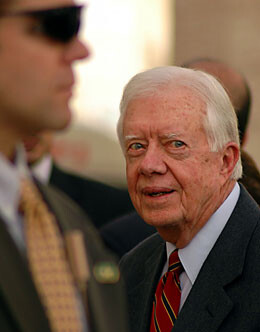The Electronic Intifada 16 April 2008

Former US president Jimmny Carter in Ramallah, January 2006. (Charlotte de Bellabre/MaanImages)
The statement was attributed to the American pro-Israel group, the Anti-Defamation League, and was obviously a reaction to news that former US president Jimmy Carter was planning to meet with Hamas leader Khaled Meshal during an upcoming visit to Damascus.
If Carter does meet with Meshal, and that has not been confirmed, I do not think many sensible people would imagine that Carter’s intent is to seek the comfortable company of a terrorist as a better alternative to meeting peace-loving Israelis.
Carter may not be counted amongst Israel’s most stalwart supporters, at least compared to other US presidents or the current candidates for office. But in reality, he has done more for Israel than any other US president, and perhaps even any other world leader.
Without the determined effort and the intense personal diplomacy of president Carter, Israel would not have achieved the one landmark breakthrough in its troubled history: the peace treaty with Egypt.
By opening this first gate for Israel, under almost impossible circumstances, Carter helped open others later, granting Israel more legitimacy even while it remained an occupier, aggressor and a flagrant and chronic violator of international law.
The peace treaty with Egypt was not Carter’s ultimate goal; he sought a resolution for the Arab-Israeli conflict in its entirety. But faced with tenacious obstructionism and intransigence on the Israeli side, and hesitation and uncertainty on the Arab side, Carter settled for what he thought was possible: peace with Egypt and promises of autonomy for the Palestinians.
Had Carter’s more ambitious efforts been fully implemented, the region might have avoided decades more of conflict and might have seen security and prosperity already achieved. Israel might have been free from the “terror” it reaps in reaction to its oppression of others and its occupation of their lands. Perhaps many of the tragedies that have, in the last four decades, been causing enormous devastation and harm to all of us would have been avoided.
Of course, no one can say precisely what would have happened, but what Carter tried to do is to bring the conflicting parties to a settlement based on legality and relative justice. This contrasts with other US presidents who have blindly tolerated Israel’s expansionist and illegal schemes.
Carter’s approach at least offered the prospect of normal, sustainable relations between Israelis and their neighbors, as opposed to offering an open-ended endorsement of continued Israeli aggression and colonization to the extent that the conflict is more intractable, the wounds deeper, and territorial division now practically impossible.
It is for these precise reasons that Carter is often so harshly criticized in Israel and by its US lobby. He was strongly condemned for putting Israel before the choice of “peace or apartheid” in his recent book. What he implied was no more than a warning to Israel — already publicly recognized by its own leaders — that its policies were leading it fast towards apartheid and that that was incompatible with Israel’s claimed quest for peace and normal relations.
Some of South Africa’s own anti-apartheid leaders have gone even further, saying that the system of racial discrimination Israel is implementing is even worse than what they suffered. They, too, urge Israel to change course for the sake of all Palestinians and Israelis.
But Israel has hardly ever been in the mood to receive good advice; all that it wants is unquestioning endorsement and unconditional approval of its deeds and plans. Unfortunately, most foreign leaders are prepared to provide just that, and this has been a major source of harm to both Israeli and American interests in the region.
No one can question Carter’s passion for peace, his intellectual and political sincerity, his ethical values or his integrity as a man of principle and profound faith. Since he left office, he never refrained from involving himself in sound causes, as he never slowed down his mission for a safer and better world.
If, therefore, Carter is set to hold a meeting with Meshal, it would be ridiculous to think that he is meeting a “terrorist” or that he is signaling his support for terror, or even for the continuation of any form of violence against Israel or in the region in general.
Israeli and other Carter critics surely know this. Their concern, however, must be twofold. One is that such contacts are slowly breaking the isolation of Hamas when what is desired by Israel is Hamas’ delegitimization and destruction. The other is the genuine fear that Meshal’s message to Carter may be able to shake the myth that Hamas wants simply to destroy Israel, or continue on a course of war and violence for the sake of it.
Meshal may repeat the same language he used in an op-ed in The Guardian on 31 January 2006, just after Hamas was declared the winner in the Palestinian general elections. There, he extended a message of peace to Israel, based on full rights and reciprocity, starting with a long-term truce. But this was still distant from the Israeli-tailored terms applied by the so-called international community for accepting to deal with Hamas.
It is also unlikely that Carter would come out of a meeting with Meshal fully convinced of the Hamas program, but he may not adopt the notion that Hamas is merely a terrorist organization and an obstacle to peace that no one should ever talk to. Indeed, in an interview with Haaretz, he stressed that to make peace you have to talk to everyone. That possibility alone is frightening enough for an Israel that has no interest in genuine negotiations or an end to conflict that requires it to recognize the rights of the Palestinians.
Hasan Abu Nimah is the former permanent representative of Jordan at the United Nations. This article first appeared in The Jordan Times and is reprinted with the author’s permission.
Related Links





